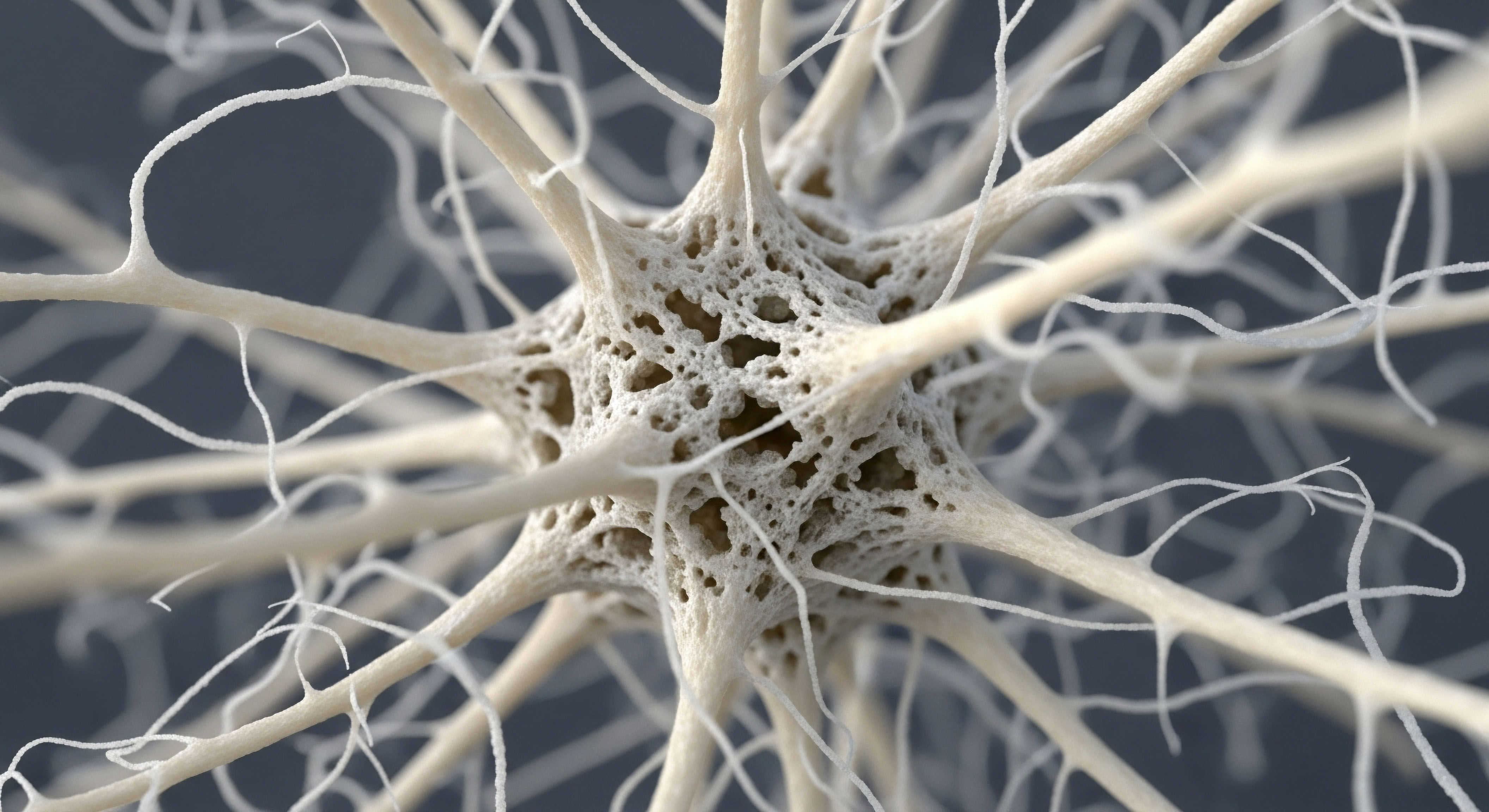

Fundamentals
When persistent fatigue settles in, or when mood shifts become an unwelcome constant, it is natural to seek explanations. Perhaps you have noticed changes in your body composition, or a diminished drive that once defined your days. These experiences, often dismissed as simply “getting older” or “stress,” frequently point to deeper physiological imbalances, particularly within your hormonal systems.
Understanding these shifts, and how they connect to your overall vitality, begins with recognizing the intricate web of biological processes that shape your daily experience. Your personal journey toward reclaiming optimal function starts with a clear, evidence-based understanding of your own internal landscape.
The endocrine system, a complex network of glands and hormones, orchestrates nearly every bodily function, from metabolism and mood to sleep and reproductive health. Hormones act as chemical messengers, traveling through the bloodstream to target cells, initiating specific responses.
When these messengers are out of balance, the ripple effects can be profound, impacting how you feel, how you think, and how your body performs. Many individuals seek hormonal optimization protocols to address these imbalances, aiming to restore a sense of well-being and robust physiological function.

The Gut Microbiome and Hormonal Interplay
Beneath the surface of our awareness, within the vast expanse of the human digestive tract, resides a bustling community of microorganisms known as the gut microbiome. This collection of bacteria, fungi, and viruses, numbering in the trillions, performs a remarkable array of functions that extend far beyond digestion.
It acts as a metabolic organ, influencing nutrient absorption, immune system regulation, and even neurotransmitter production. A growing body of scientific inquiry reveals a significant connection between the health of this microbial ecosystem and the effectiveness of strategies designed to optimize hormonal balance.
The gut microbiome significantly influences hormonal balance and the efficacy of endocrine system support.
Consider the dynamic relationship between your gut bacteria and circulating hormones. Certain hormones, particularly estrogens, undergo a continuous cycle of processing within the body. After being produced, they are often conjugated in the liver, a process that makes them water-soluble for excretion. However, specific bacterial enzymes within the gut can deconjugate these hormones, allowing them to be reabsorbed into the bloodstream. This enterohepatic circulation directly impacts the overall levels of active hormones available to your tissues.

Bacterial Influence on Hormone Metabolism
The collective genetic material of gut microbes, known as the metagenome, codes for a diverse range of enzymes. One such enzyme, beta-glucuronidase, is particularly relevant to estrogen metabolism. When this enzyme is highly active, it can deconjugate a significant amount of estrogen, leading to higher circulating levels. Conversely, an imbalance in gut bacteria, often termed dysbiosis, can disrupt this delicate process, potentially leading to either an excess or deficiency of certain hormones.
This intricate biochemical recalibration extends to other hormonal pathways as well. The gut microbiome influences the production of short-chain fatty acids (SCFAs) like butyrate, acetate, and propionate, which are fermentation products of dietary fiber. These SCFAs serve as vital energy sources for colonocytes, the cells lining the colon, and possess systemic effects, including anti-inflammatory properties and modulation of metabolic health. A healthy production of SCFAs supports overall metabolic function, which is intrinsically linked to endocrine system regulation.


Intermediate
As we move beyond the foundational concepts, it becomes clear that the gut’s influence on hormonal health is not merely theoretical; it holds tangible implications for the effectiveness of clinical protocols. When individuals undertake hormonal optimization protocols, such as testosterone replacement therapy or growth hormone peptide therapy, the state of their internal microbial environment can significantly alter the outcomes.
The body’s ability to absorb, metabolize, and utilize these therapeutic agents is deeply intertwined with the function of the digestive system and its microbial inhabitants.

Gut Health and Therapeutic Efficacy
The bioavailability of orally administered medications, including some hormonal agents or ancillary compounds, relies heavily on a healthy gastrointestinal tract. An inflamed or imbalanced gut can compromise the integrity of the intestinal lining, affecting absorption rates and potentially leading to systemic inflammation. This systemic inflammation, often characterized by elevated inflammatory markers, can desensitize hormone receptors, making the body less responsive to both endogenous hormones and exogenous therapeutic interventions.
Gut inflammation can diminish the body’s responsiveness to hormonal therapies by desensitizing receptors.
Consider the specific applications within hormonal optimization. For men undergoing Testosterone Replacement Therapy (TRT), protocols often involve weekly intramuscular injections of Testosterone Cypionate. While injections bypass the initial digestive absorption, the overall metabolic environment, shaped by gut health, still plays a role in the hormone’s subsequent processing and utilization.
Ancillary medications, such as Anastrozole, used to manage estrogen conversion, or Gonadorelin, which supports natural testosterone production, are often administered orally or subcutaneously. The body’s processing of these compounds can be influenced by the gut’s metabolic capacity.

Impact on Specific Protocols
For women receiving testosterone support, typically via subcutaneous injections of Testosterone Cypionate or through pellet therapy, the systemic environment remains critical. Progesterone, often prescribed based on menopausal status, can be administered orally, making its absorption and metabolism directly subject to gut conditions. A healthy gut ensures optimal processing and reduces the burden of inflammatory byproducts that could interfere with hormonal signaling.
Growth hormone peptide therapies, utilizing agents like Sermorelin, Ipamorelin / CJC-1295, or Tesamorelin, aim to stimulate the body’s natural growth hormone release. While these are typically injected, the systemic metabolic health, heavily influenced by the gut microbiome, impacts the overall efficacy of these peptides in promoting muscle gain, fat loss, and tissue repair. A balanced gut supports efficient metabolic pathways, which are essential for the downstream effects of growth hormone.
The gut microbiome’s role extends to other targeted peptides as well. For instance, PT-141, used for sexual health, and Pentadeca Arginate (PDA), for tissue repair and inflammation, rely on a well-functioning internal environment for their optimal action. Dysbiosis can create a state of chronic low-grade inflammation, which acts as a systemic disruptor, potentially blunting the therapeutic effects of these agents.

How Gut Bacteria Influence Hormone Levels
The gut’s impact on hormones is multifaceted, involving direct and indirect mechanisms.
- Estrogen Metabolism ∞ The estrobolome, a collection of gut bacteria capable of metabolizing estrogens, dictates the recirculation of estrogens. An imbalanced estrobolome can lead to either an excess or deficiency of circulating estrogens, affecting conditions from peri-menopause symptoms to testosterone conversion in men.
- Testosterone Conversion ∞ While less direct than estrogen, certain gut bacteria can influence enzymes involved in steroidogenesis, the process of creating steroid hormones, including testosterone. They can also affect the overall inflammatory state, which impacts testosterone production and receptor sensitivity.
- Thyroid Hormone Activation ∞ A significant portion of inactive thyroid hormone (T4) is converted to its active form (T3) in the gut. A healthy microbiome is essential for this conversion, directly influencing metabolic rate and energy levels.
- Insulin Sensitivity ∞ Gut dysbiosis can contribute to insulin resistance, a condition where cells become less responsive to insulin. Insulin resistance directly impacts sex hormone-binding globulin (SHBG) levels and can alter the balance of free versus bound hormones, affecting their biological activity.
| Hormone/Protocol | Gut Microbiome Influence | Mechanism of Impact |
|---|---|---|
| Testosterone Replacement Therapy (Men) | Systemic inflammation, metabolic health | Inflammation reduces receptor sensitivity; poor metabolism affects utilization. |
| Testosterone Support (Women) | Estrogen metabolism, inflammation | Estrobolome affects estrogen balance; inflammation impacts receptor function. |
| Progesterone Use | Absorption, enterohepatic circulation | Gut integrity affects oral absorption; bacterial enzymes influence recirculation. |
| Growth Hormone Peptides | Metabolic efficiency, systemic inflammation | Healthy gut supports efficient metabolic pathways for peptide action. |
| Ancillary Medications (e.g. Anastrozole) | Absorption, detoxification pathways | Gut health influences drug absorption and liver detoxification processes. |

Can Gut Imbalance Affect Hormone Therapy Outcomes?
The answer is a resounding yes. An imbalanced gut, characterized by a lack of microbial diversity or an overgrowth of pathogenic bacteria, can create a state of chronic low-grade inflammation. This inflammation can directly interfere with hormonal signaling pathways, reduce the effectiveness of hormone receptor sites, and increase the metabolic burden on the liver and other organs involved in hormone processing. Addressing gut health becomes a fundamental step in optimizing the environment for any hormonal intervention to succeed.


Academic
To truly grasp the profound connection between the gut microbiome and endocrine function, we must venture into the molecular and systems-biology level. The gut is not merely a passive conduit for nutrients; it is a dynamic bioreactor, actively participating in the synthesis, metabolism, and regulation of a vast array of compounds, many of which directly interact with the host’s hormonal milieu.
This deep exploration reveals how microbial activities can either support or undermine the delicate balance required for optimal physiological function and the success of hormonal optimization protocols.

Microbial Enzymatic Activity and Steroidogenesis
The microbial community within the gut possesses an extensive enzymatic repertoire that directly impacts steroid hormone metabolism. Beyond the well-documented beta-glucuronidase, other bacterial enzymes, such as sulfatases and reductases, play roles in deconjugating and modifying various steroid metabolites.
For instance, certain gut bacteria can convert androgens into estrogens or vice versa, influencing the overall androgen-to-estrogen ratio. This microbial transformation can significantly alter the pool of active hormones available to the body, impacting everything from muscle anabolism to neuroendocrine signaling.
Gut microbes possess enzymes that directly modify steroid hormones, altering their bioavailability and impact.
The interplay extends to the synthesis of steroid precursors. While the primary sites of steroidogenesis are the adrenal glands and gonads, gut microbiota can influence the availability of cholesterol and other metabolic intermediates through their impact on bile acid metabolism.
Bile acids, synthesized in the liver and modified by gut bacteria, act as signaling molecules that regulate lipid metabolism and inflammation, both of which are intrinsically linked to hormonal health. Dysregulation of bile acid profiles by an aberrant microbiome can therefore indirectly affect the substrate availability for hormone synthesis.

The Gut-Brain-Endocrine Axis Interplay
The concept of the gut-brain axis is well-established, describing the bidirectional communication between the central nervous system and the enteric nervous system. This axis is not isolated; it is deeply intertwined with the endocrine system, forming a complex gut-brain-endocrine axis.
Gut microbes produce neurotransmitters like serotonin and gamma-aminobutyric acid (GABA), and their metabolites can influence hypothalamic-pituitary-adrenal (HPA) axis activity, thereby affecting stress response and cortisol levels. Chronic activation of the HPA axis, often driven by gut dysbiosis and systemic inflammation, can suppress the hypothalamic-pituitary-gonadal (HPG) axis, leading to reduced production of sex hormones like testosterone and estrogen.
Furthermore, the integrity of the intestinal barrier, often referred to as gut permeability or “leaky gut,” is a critical factor. When this barrier is compromised, bacterial components, such as lipopolysaccharide (LPS) from gram-negative bacteria, can translocate into the systemic circulation. LPS is a potent inflammatory trigger, activating immune responses that lead to chronic low-grade inflammation.
This systemic inflammation is a known disruptor of endocrine function, contributing to insulin resistance, thyroid dysfunction, and impaired sex hormone signaling by reducing receptor sensitivity and increasing hormone clearance rates.

Clinical Implications of Microbiome Modulation
Research continues to uncover the specific bacterial genera and species involved in these hormonal interactions. For example, certain species within the Clostridia class are known for their ability to produce short-chain fatty acids, which have systemic anti-inflammatory effects that support metabolic and hormonal health. Conversely, an overgrowth of certain proteobacteria can contribute to endotoxemia and systemic inflammation.
The implications for hormone optimization protocols are substantial. Modulating the gut microbiome through targeted interventions, such as specific probiotic strains, prebiotics, or dietary changes, could enhance the efficacy of exogenous hormone administration and support endogenous hormone production. Clinical trials are exploring how these interventions might ∞
- Improve Hormone Bioavailability ∞ By optimizing gut barrier function and reducing inflammation, leading to better absorption and utilization of oral medications and supplements.
- Reduce Estrogen Dominance Symptoms ∞ Through the regulation of beta-glucuronidase activity and the balance of the estrobolome, helping to manage estrogen levels more effectively.
- Enhance Metabolic Sensitivity ∞ By improving insulin sensitivity and reducing systemic inflammation, creating a more receptive environment for hormonal signaling.
- Support Neuroendocrine Balance ∞ By influencing neurotransmitter production and HPA axis regulation, contributing to better mood, sleep, and stress resilience, all of which impact hormonal health.
| Bacterial Group/Species | Primary Hormonal Connection | Clinical Relevance to Optimization |
|---|---|---|
| Estrobolome (e.g. certain Bacteroides, Clostridia) | Estrogen deconjugation and recirculation | Directly impacts circulating estrogen levels, influencing female hormone balance and male estrogen management. |
| Butyrate Producers (e.g. Faecalibacterium prausnitzii) | Anti-inflammatory, metabolic health | Reduces systemic inflammation, improving hormone receptor sensitivity and overall metabolic efficiency. |
| LPS-producing Gram-negatives (e.g. certain Proteobacteria) | Systemic inflammation, insulin resistance | Contributes to chronic inflammation, impairing hormonal signaling and increasing metabolic burden. |
| Bile Acid Modifiers (e.g. certain Clostridium species) | Lipid metabolism, steroid precursor availability | Influences cholesterol and bile acid profiles, indirectly affecting steroid hormone synthesis. |
The scientific literature increasingly supports a holistic view of hormonal health, where the gut microbiome is recognized as a central regulator. For those seeking to optimize their hormonal systems, understanding and addressing gut health is not an ancillary consideration; it is a fundamental component of a comprehensive, personalized wellness strategy. The intricate biochemical conversations occurring within the gut hold significant sway over the body’s ability to respond to and benefit from targeted endocrine system support.

References
- Baker, J. M. et al. “Estrogen Metabolism and the Gut Microbiome.” Journal of Steroid Biochemistry and Molecular Biology, vol. 172, 2017, pp. 165-172.
- Cryan, J. F. and Dinan, T. G. “Mind-altering Microbes ∞ The Gut Microbiota as a Key Regulator of Brain and Behaviour.” Nature Reviews Neuroscience, vol. 13, no. 10, 2012, pp. 701-712.
- Neuman, H. et al. “The Gut Microbiome and the Hypothalamic-Pituitary-Adrenal Axis ∞ Implications for Stress and Mood.” Psychoneuroendocrinology, vol. 109, 2019, p. 104391.
- Tilg, H. and Moschen, A. R. “Metabolic Endotoxemia ∞ What Is the Role of the Gut Microbiota?” Gut, vol. 65, no. 1, 2016, pp. 151-155.
- Maki, K. C. et al. “Effects of Tesamorelin on Visceral Adiposity and Metabolic Parameters in HIV-Infected Patients ∞ A Meta-Analysis of Clinical Trials.” Clinical Infectious Diseases, vol. 60, no. 3, 2015, pp. 443-453.
- Boron, W. F. and Boulpaep, E. L. Medical Physiology. 3rd ed. Elsevier, 2016.
- Guyton, A. C. and Hall, J. E. Textbook of Medical Physiology. 13th ed. Elsevier, 2016.
- The Endocrine Society. “Clinical Practice Guideline ∞ Testosterone Therapy in Men with Hypogonadism.” Journal of Clinical Endocrinology & Metabolism, vol. 102, no. 11, 2017, pp. 3864-3899.

Reflection
As you consider the intricate connections between your gut and your hormones, perhaps a new perspective on your own health journey begins to take shape. The insights shared here are not simply academic points; they are invitations to a deeper understanding of your own biological systems. Recognizing the profound influence of your internal microbial ecosystem on your endocrine balance can shift your approach to well-being from reactive to truly proactive.
This knowledge serves as a foundation, a starting point for personal exploration. The path to reclaiming vitality and optimal function is often unique to each individual, requiring careful consideration of your specific physiological landscape. Armed with a clearer picture of how these systems interact, you are better equipped to engage in informed conversations about your health, guiding your choices toward a future of sustained well-being and uncompromised function.



